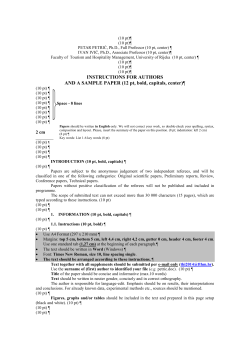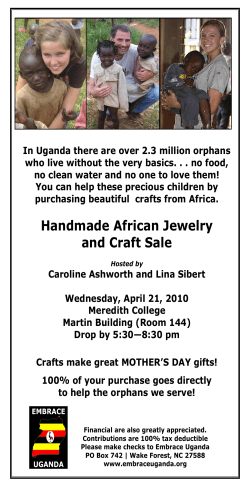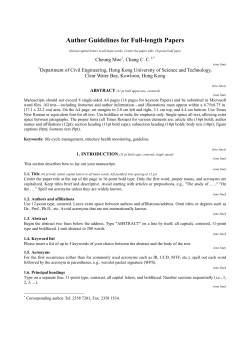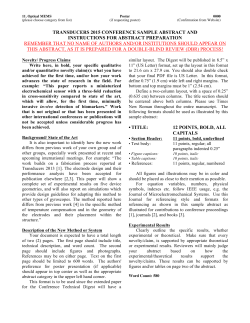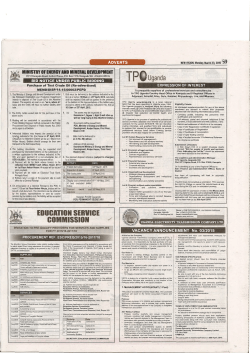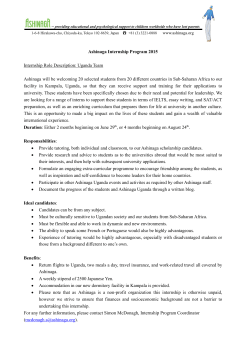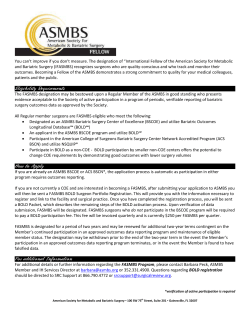
BOLD_Newsletter_Issue2_2015 - BOLD â Better Outcomes in
BOLD Project Newsletter Issue 2 | April 2015 INTRODUCTION Purpose of BOLD The Department of Reproductive Health and Research, World Health Organization, initiated the “Better Outcomes in Labour Difficulty” (BOLD) project to accelerate the reduction of intrapartum-related maternal, fetal and newborn mortality and morbidity. BOLD seeks to address weaknesses in the process of labour care and bridge the disconnect between the health systems and the communities in low resource settings. This project, funded by the Bill & Melinda Gates Foundation, seeks to achieve this goal through a two-pronged approach: (1) by developing a Simplified, Effective, Labour Monitoringto-Action tool (SELMA) to assist healthcare providers to monitor labour and take decisive actions more efficiently; and (2) by developing innovative tools (“Passport to Safer Birth”), designed together with women, communities and healthcare providers, to promote access to respectful, quality care during childbirth. BOLD workflow and analysis plan This figure depicts the BOLD workflow and analysis plan to demonstrate how findings from the qualitative research, service design and cohort study activities will be integrated into the development of SELMA and the Passport to Safer Birth (the BOLD Strategy). 1/6 BOLD Project Newsletter Issue 2 | April 2015 PROJECT UPDATES SELMA UPDATES Nigeria Data collection for SELMA effectively commenced middle of February 2015 after a protracted industrial crisis in the health sector. Happily, all sites have settled fully into the study and data collection is progressing well. We have received a total of 704 forms from all sites. Data entry onto the database is progressing satisfactorily, thanks to the meticulous work of Tosin Lawal. All hands are on deck to ensure successful implementation of BOLD Project in Nigeria. Brazil With data collection ongoing in Uganda and Nigeria, the BOLD Brazil team has continued to ensure high data quality. In the last month, new check algorithms were developed and communication with Uganda and Nigeria teams was considerably improved. What is SELMA? Labour complications are an important cause of mortality, morbidity and long-term disabilities for both mothers and babies. Given the current challenges with labour monitoring and decision-making during labour and childbirth, a Simplified, Effective, Labour Monitoring-to-Action (SELMA) tool will be developed. To do so, a prospective cohort study is being conducted in eight health facilities: four in Nigeria and four in Uganda. Data from the cohort study will inform the development of prediction models to identify women at risk of adverse intrapartum outcomes throughout the course of labour. These prediction models will be used to assemble a decision-support tool that can identify the best course of action to avert poor labour outcomes. Data are exported and checked weekly from RedCap system in order to find missing values, logical problems and out of bounds measures. Problems are promptly reported and corrected in the local databases. Skype meetings are held biweekly with the data management teams – i.e., Brazil, Uganda and Nigeria - to clarify problems and find solutions. Today we have a total of 2,749 records in the system: 2,326 from Uganda and 423 from Nigeria. Uganda Data collection in Uganda has been ongoing since December 2014. Uganda now has roughly 4,500 completed forms for eligible cases. Meeting with the BOLD research team at Wuse General Hospital, Abuja The Uganda data management team is working to enter new forms into RedCap. They are also in the process of conducting a rapid analysis of the primary end point, to ensure that the target sample size meets the objectives of the study. Cross-checking the BOLD logbook with the labor registry at Maitama District Hospital 2/6 BOLD Project Newsletter Issue 2 | April 2015 PROJECT UPDATES PASSPORT TO SAFER BIRTH UPDATES Nigeria We are making appreciable progress with BOLD Formative Study in Nigeria. Our teams of interviewers at all sites continue to send positive feedback. A total of 95 in-depth interviews have been conducted out of which 58 had been transcribed; 22 focus group discussions have also been conducted, with 6 transcribed thus far. Uganda As of 23 March, the BOLD Formative-Uganda team has conducted a total of 77 in-depth interviews and 16 focus group discussions across the four Uganda study sites. The team is wrapping up the final batch of interviews and focus groups. In the next few weeks, they are focusing on finalising transcriptions and sharing initial insights with the research team, led by David Kyaddondo of Makerere University. What is the Passport for Safer Birth? The Passport to Safer Birth will be an innovative set of services and tools, designed together with women, communities and healthcare providers, to promote access to and awareness of respectful, quality care during childbirth. The development of the Passport to Safer Birth will be an iterative process comprised of two activities: primary qualitative research and service design. These activities use innovative methods to explore and understand needs, expectations and preferences of women, communities and healthcare providers regarding childbirth experiences, and the provision of high quality labour monitoring and timely, safe and effective interventions during labour and childbirth. Focus group discussion with women near Akure, Nigeria [photo credit: Ms. Olalere] A researcher obtains consent from a woman in Nigeria [photo credit: Ms. Ojelade] Meeting with the BOLD research team at Maitama District Hospital 3/6 BOLD Project Newsletter Issue 2 | April 2015 PROJECT UPDATES PASSPORT TO SAFER BIRTH UPDATES Service design The design research team of M4ID conducted together with the local partners in Uganda and Nigeria field visits to the different BOLD facilities and their surrounding communities in November 2014 and February 2014. Over 90 interviews have been conducted with a diversified set of people ranging from pregnant women, husbands, mother in laws, facility staff to religious leaders and traditional birth attendants (see all contributors on boldinnovation.org/contributors). In addition to these, observations have been conducted at different points of the women’s journey through pregnancy and delivery including Antenatal Care visits, Referral, Admission and Registration as well as Labour, Delivery and Postnatal Ward with Discharge. A group discussion with women in Uganda Sketching ideas and thoughts after a research day In a several weeklong process, the design team analyzed together with the local teams the observation and interview experiences as well as the transcribed interviews. The aim was to understand different community member’s perception, experiences and knowledge with regards to pregnancy and childbirth and identify opportunities to improve the demand and provision of quality of care at time of birth. During the analysis process themes have been identified that represent a focus area for the design process. For each of these themes key insights have been summarized as well as inspirations for design and a set of opportunities. These opportunities will form the base for the co-design workshops in the next phase of the design process, where different key stakeholders (women, men, midwives) will workshop together to create concrete ideas for opportunities. The design team will visit Kampala in the second week of April to conduct a first set of co-design workshops together with women, men and midwives. Participants of the workshops will be tasked with creative exercises to ideate solutions around improving aspects of the quality of care within the facility. This can be designing an information poster or a clear visual path for the women through the facility. Check out the next newsletter to get a glimpse on some f the ideas that will have come up in these workshops. Mapping of themes and insights 4/6 Identified themes for design BOLD Project Newsletter Issue 2 | April 2015 BOLD NEWS Nigeria design research field visit BOLD site visit to Abuja On 5 March 2015, Meghan Bohren (WHO), Bukola Fawole and Titiloye Musibau (University of Ibadan) conducted site visits to the three Abuja hospitals (Wuse General Hospital, Maitama District Hospital and Asokoro District Hospital). We met with the BOLD research teams (in particular, Dr. Alu and Dr. Anate at Maitama, Dr. Alabi at Wuse, and Dr. Adebayo, Dr. Osaze and Mrs. Musa at Asokoro) to review the data collection process, compare study logbooks to birth registries and discuss any issues related to the study. We were pleased to see that the study teams were progressing well with data collection and capturing all relevant cases. In February 2015, the M4ID design team (Melanie Wendland, Damaris Rodriguez, Reima Rönnholm and Maiju Nöyränen) visited Nigeria to conduct similar design research activities as in Uganda in November 2014. Dr. Bukola Fawole hosted the team with so much dedication and effort, thank you!! The team was accompanied by the two researchers Mrs. Ojelade Olubunmi and Mrs. OlalereAkinfenwa, who supported the team with conducting interviews and observations and providing local insights. The team visited the Maitama District Hospital in Abuja as well the Mother & Child hospital in Akure and also spent time in adjacent communities. After each research day, the team spent time analysing the impressions and experiences as well as mapping initial ideas and opportunities for service solutions. The local team made this week a very insightful and productive visit for the progress of the PSB activities. Thank you to all of you! We also met with representatives of the BOLD-Abuja formative research team at the FCT Primary Health Care Development Board. We discussed the Abuja team’s progress to date and developed a plan to finish data collection. Kudos to the hard work of the Abuja BOLD teams! The design research team with Maitama Hospital staff Meeting to share and prioritise insights from M4ID design research field visits On 13 March 2015, Melanie Wendland and Mari Tikkanen from M4ID visited Geneva to meet with the WHO study coordinating team to share their insights and opportunities for design from the initial design research trips to Uganda and Nigeria. The group worked together to integrate initial findings from the BOLD qualitative research into the design research plan. The meeting resulted in a set of thirteen prioritized themes to increase demand for and provision of quality of care during childbirth, for further exploration during the co-design phase. Meeting with the BOLD research team at Asokoro District Hospital RECENT BOLD ACTIVITIES UPCOMING BOLD ACTIVITIES • • • • • • 5/6 Nigeria initial design trip to Abuja and Akure: 23-27 February 2015 Site visit to Abuja hospitals – 5 March 2015 Site visit to Abuja BOLD formative team – 5 March 2015 M4ID insight sharing meeting in Geneva – 13 March 2015 • • Co-design visit in Uganda – April 2015 Exploring SELMA models through data simulation in Brazil – April 2015 Site visit to Uganda – May 2015 Midterm project review meeting in Geneva – June 2015 BOLD Project Newsletter Issue 2 | April 2015 MEET THE BOLD TEAM Damaris Rodriguez, Senior Service Designer at M4ID, working with design research and concept design for the Passport to Safer Birth objective. What is the most fascinating aspect of the BOLD project? “The BOLD project brings a unique opportunity to link different challenges in maternal health that haven´t been connected and tackled before as a whole, e.g. bringing together all the people involved directly or indirectly in the pregnancy and delivery process. It has been very inspiring to speak with men, birth companions, Community Health Workers, Church leaders and family members to understand and identify the opportunities for the Passport to Safer Birth objective. In essence BOLD is going beyond the women´s or health practicioners perspective to join forces so everyone will be part of future solutions.” This newsletter is designed for all those involved or interested in the BOLD project. We hope that this publication will keep you up-to-date on current and upcoming activities, accomplishments by the team, and important project changes. The newsletter will be distributed bi-monthly, with the next issue scheduled for June 2015. We welcome submissions of project updates by any team member for inclusion in the newsletter. Please submit material by 22 May 2015 to Meghan Bohren ([email protected]) for the next newsletter. Visit us on the web at www.boldinnovation.org Thank you to all BOLD members for contributing content. Project partners 6/6 BOLD study sites: Maitama District Hospital, Abuja, Nigeria (Dr. Frank E. ALU, Coordinator) Asokoro District Hospital, Abuja, Nigeria (Dr. Amos A. ADEBAYO, Coordinator) Wuse II District Hospital, Abuja, Nigeria (Dr. Olubunmi Abraham ALABI, Coordinator) Mother and Child Hospital, Akure, Nigeria (Dr. Adesina AKINTAN, Coordinator) Mulago Hospital, Kampala, Uganda (Dr. Miriam Nakalembe, Coordinator) St. Francis Hospital Nsambya, Kampala, Uganda (Dr. Othiniel Musana, Coordinator) Mengo Hospital, Kampala, Uganda (Dr. Michael Bukenya, Coordinator) Lubaga Hospital, Kampala, Uganda (Dr. Salim Bataale, Coordinator)
© Copyright 2026
